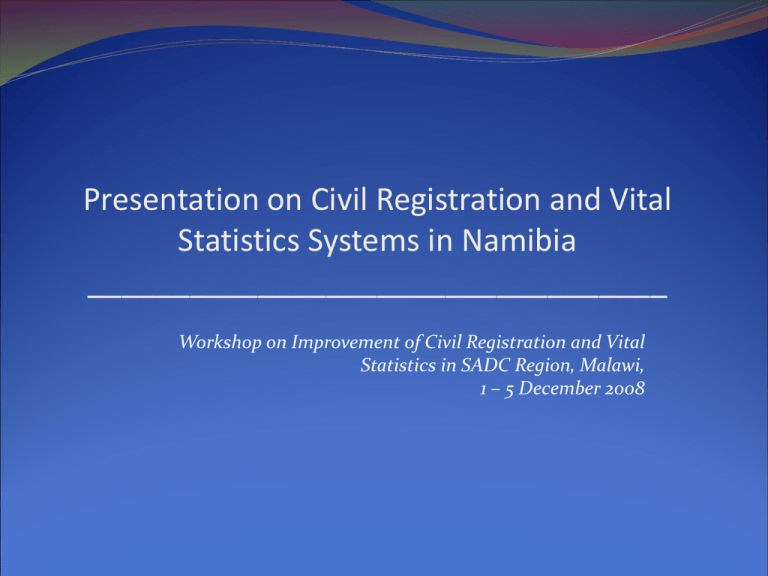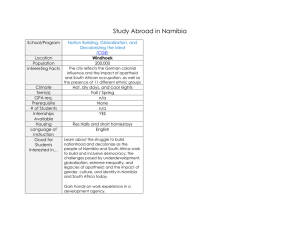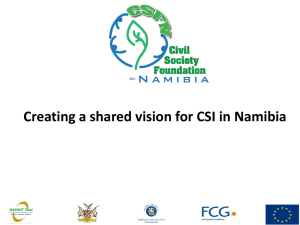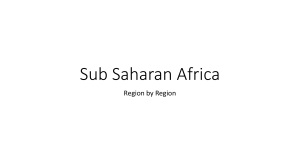Presentation on Civil Registration and Vital Statistics Systems in Namibia __________________________________
advertisement

Presentation on Civil Registration and Vital Statistics Systems in Namibia __________________________________ Workshop on Improvement of Civil Registration and Vital Statistics in SADC Region, Malawi, 1 – 5 December 2008 Outline • Introduction • Objective • Legal Framework • • • • • MHAI CBS Data collection Compiling Dissemination Obstacles Plans for improvement Introduction The civil registration is done by the Ministry of Home Affairs and Immigration under Civil Registration Office It is a compulsory exercise in Namibia, that. means every birth that occurred within the Namibian territory has a constitutional right to be registered. Methods used to enforce civil registration in Namibia Every child registering for school must have a birth certificate Accessibility to hospital services, social grant, heritages, medical aids, bursaries and school loans, etc… require identifications documents Bank services, insurance claims, legal representations, high purchases such mortgages, vehicles, etc…, also require identification documents. It is illegal to burry a body without burring certificate, but to obtain it you the deceased identification documents Employment in government institutions as well as private sectors need provision identification documents. Introduction cont’s Civil registration serves two main purposes in Namibia First one: to produce legal documentations such as birth certificates, identity cards (16+), passports, death and marriage certificates Second one: to produce vital statistics that is crucial in policy formulation, planning and implementing social and economic development programmes. Introduction cont’s Central Bureau of Statistics (CBS) Responsible for data collecting, analyzing and disseminating statistical information. Coordinates all statistical activities by other government and private agencies Objective This paper looks at: The obstacles and challenges that are faced in the civil registration and the production of vital statistics in Namibia Legal Framework Ministry of Home Affaires and Immigration (MHAI) The Civil registration is the responsibility of the MHAI: births, natural/unnatural death, marriages and divorces are required to be registered according to the Namibian Constitution. MHAI is guided by Act No. 81 of 1963 Amended by Act No. 41 of 1986, currently under revision This act plays a vital role towards the registration of these events. Legal Framework cont’s Central Bureau Of Statistics (CBS) Data collection in Namibia operates under the provision of Statistics Act No 66 of 1976. Statistical Act sanctions CBS to authorize the undertaking of population censuses, surveys and other form of data collection activities including the vital statistics Data collection should be performed within Namibian territory The act also enforces confidentiality of information by the Oath of Secrecy Oath of Secrecy administered to anyone who is engaged in the production of statistics at all levels. Act is currently being reviewed Data collection Vital statistics in Namibia currently obtained through - population censuses and sample surveys Censuses and surveys collect data specifically on demographic characteristics These characteristics include specific questions on fertility and mortality These sources are not a replacement of civil registration, but rather depict births and deaths estimates in Namibia Compiling Fertility and mortality levels are compiled from Namibia population censuses and sample surveys. 2001 Census collected information on registration status of last live birth and reported deaths in 2001 in order to assess their coverage in the country 2001 census results show that 75% of last live births and 70% of deaths in 2001 were registered Sample surveys also collect the same information at a different reference point (usually 5yrs after census) Dissemination Censuses and surveys results are disseminated through publication Results from the censuses and surveys are not sufficiently detailed enough to satisfy the needs of users Obstacles Civil registration of vital events is manually operated in MHAI. This contributes to the lack of production of vital statistics Registration forms are scattered in different parts of the country. The registration of births are mixed: recent and late registration Lack of capacity to capture these data into computer system at all points of registration at the Ministry of Home Affairs and CBS Obstacles cont’s Civil registration is also hampered by cultures and customs believes i.e. some tribal groups are hesitating to follow the government instructions Awareness level is low among vulnerable and nomadic groups e.g Sans, Ovahimba and Ovazemba tribes. They hardly listen to the radio and other media as the method used to educate people on the importance of civil registration. Before independence, civil registration was not compulsory to indigenous people, this has caused late registration which is still uncompleted. Obstacles Cont’s Lack of harmonization of concepts and definitions used in registering vital events E.g. usage of old boundary system (districts), instead of regions/constituencies that are being used in CBS data collection format Registrations form does not include the following characteristics: Education, economic activities and place of usual residence of parents incase of birth and death Geographical information, which include location, place of occurrence, place of registration, etc…. Plans for improvement Namibia sees the importance of registration of vital events and the production of vital statistics for planning and decision making The MHAI is currently embarked on the project to Automate the civil registration system. Date of completion not known Plans for improvement Provision of more Birth Registration at Health facilities. Increase awareness Budget fore more mobile registration to reach the remote areas for birth registration. Open more Sub-Regional Offices in all Constituencies. Plans for improvement cont’s CBS is also engaged on activities to build its institutional capacity to be able to compile vital statistics. e.g. revising its structure, to decentralize its functions at regional levels. revising of the Statistics Act to strengthen CBS coordination role. Our two institutions are working together to improve the registration forms so that concepts and definitions are harmonized. Thanks for your attention __________________________




